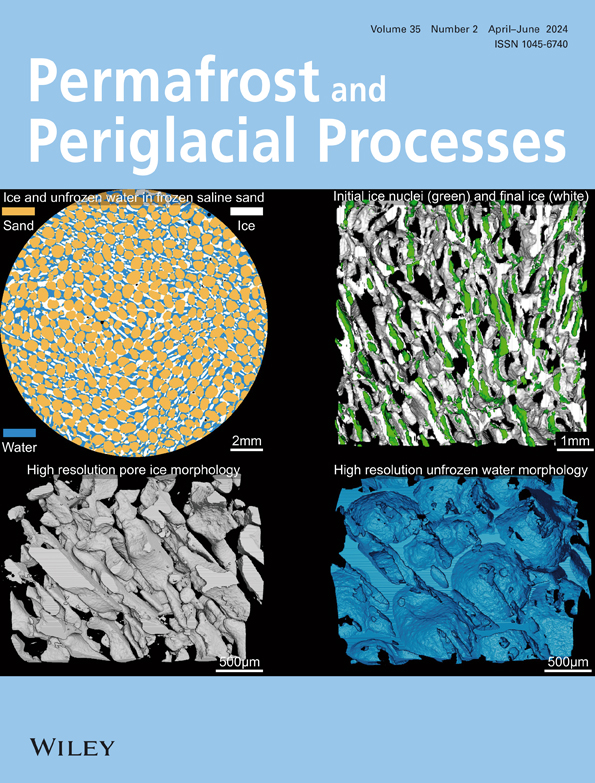青藏高原东北部热岩溶湖泊和池塘在过去三十年中的萎缩
IF 3.3
3区 地球科学
Q2 GEOGRAPHY, PHYSICAL
引用次数: 16
摘要
识别热岩溶湖动态变化对多年冻土区景观尺度的水文、生态和碳收支评估有重要贡献。对黄河中南部源区代表性多年冻土区(150 km2)热岩溶湖泊和池塘的数量和面积变化进行了定量分析。水体清单使用监督最大似然分类方法从陆地卫星图像生成,时间为1986年、2000年和2015年三个时期。1986 ~ 2015年,大于0.36 ha的水体数量减少了40%(461 ~ 277个),总面积减少了25% (542 ~ 406 ha)。池塘类别(小于1公顷)的变化最为显著,其数量减少了44%,水面面积减少了41%。许多湖泊崩解,部分排干,形成了几个残存的池塘,而大多数池塘没有完全排干,而是缩小到0.36 ha以下。这些萎缩模式与HAYR气候变暖相一致,这表明永久冻土严重退化。未来的研究将集中在更好地理解热岩溶湖泊和池塘的水热动力学与景观尺度上的永久冻土退化的关系。本文章由计算机程序翻译,如有差异,请以英文原文为准。
Shrinking thermokarst lakes and ponds on the northeastern Qinghai‐Tibet plateau over the past three decades
Identifying the changes in thermokarst lake dynamics has a significant contribution to landscape‐scale hydrology, ecology, and assessment of carbon budgets in permafrost regions. Changes in the number and areal extent of thermokarst lakes and ponds were quantified in a representative permafrost area (150 km2) in the south‐central Headwater Area of the Yellow River (HAYR). Water‐body inventories were generated from Landsat satellite imageries using the supervised Maximum Likelihood Classification method for three periods: 1986, 2000, and 2015. From 1986 to 2015, the number of water bodies larger than 0.36 ha decreased by 40% (461–277), while the total surface area decreased by 25% (542–406 ha). The ponds category (smaller than 1 ha) recorded the most substantial change, as their number decreased by 44% and their water‐surface area by 41%. Many lakes disintegrated, partially drained, and formed several remnant ponds, while the majority of the ponds did not drain completely, but shrank below 0.36 ha. These shrinking patterns are consistent with the warming climate in the HAYR, which suggests intense permafrost degradation. Future research will be focused on a better understanding of water–heat dynamics of thermokarst lakes and ponds in association with permafrost degradation at a landscape scale.
求助全文
通过发布文献求助,成功后即可免费获取论文全文。
去求助
来源期刊
CiteScore
9.70
自引率
8.00%
发文量
43
审稿时长
>12 weeks
期刊介绍:
Permafrost and Periglacial Processes is an international journal dedicated to the rapid publication of scientific and technical papers concerned with earth surface cryogenic processes, landforms and sediments present in a variety of (Sub) Arctic, Antarctic and High Mountain environments. It provides an efficient vehicle of communication amongst those with an interest in the cold, non-glacial geosciences. The focus is on (1) original research based on geomorphological, hydrological, sedimentological, geotechnical and engineering aspects of these areas and (2) original research carried out upon relict features where the objective has been to reconstruct the nature of the processes and/or palaeoenvironments which gave rise to these features, as opposed to purely stratigraphical considerations. The journal also publishes short communications, reviews, discussions and book reviews. The high scientific standard, interdisciplinary character and worldwide representation of PPP are maintained by regional editorial support and a rigorous refereeing system.

 求助内容:
求助内容: 应助结果提醒方式:
应助结果提醒方式:


